ASP.NET developers are at the heart of software development teams, creating dynamic web applications and services. They bridge the gap between server-side technology and the user experience, ensuring robust, scalable, and efficient web solutions.
Skills required for an ASP.NET developer include a strong grasp of .NET frameworks, proficiency in C# and SQL, and a solid understanding of web technologies like HTML, CSS, and JavaScript. Additionally, they need good problem-solving abilities and effective communication skills.
Candidates can write these abilities in their resumes, but you can’t verify them without on-the-job ASP Net Developer skill tests.
In this post, we will explore 8 essential ASP Net Developer skills, 9 secondary skills and how to assess them so you can make informed hiring decisions.
Table of contents
8 fundamental ASP Net Developer skills and traits
The best skills for ASP Net Developers include C Sharp Proficiency, ASP.NET Framework, MVC Architecture, Entity Framework, SQL Skills, Web API Development, JavaScript Integration and Debugging & Testing.
Let’s dive into the details by examining the 8 essential skills of a ASP Net Developer.
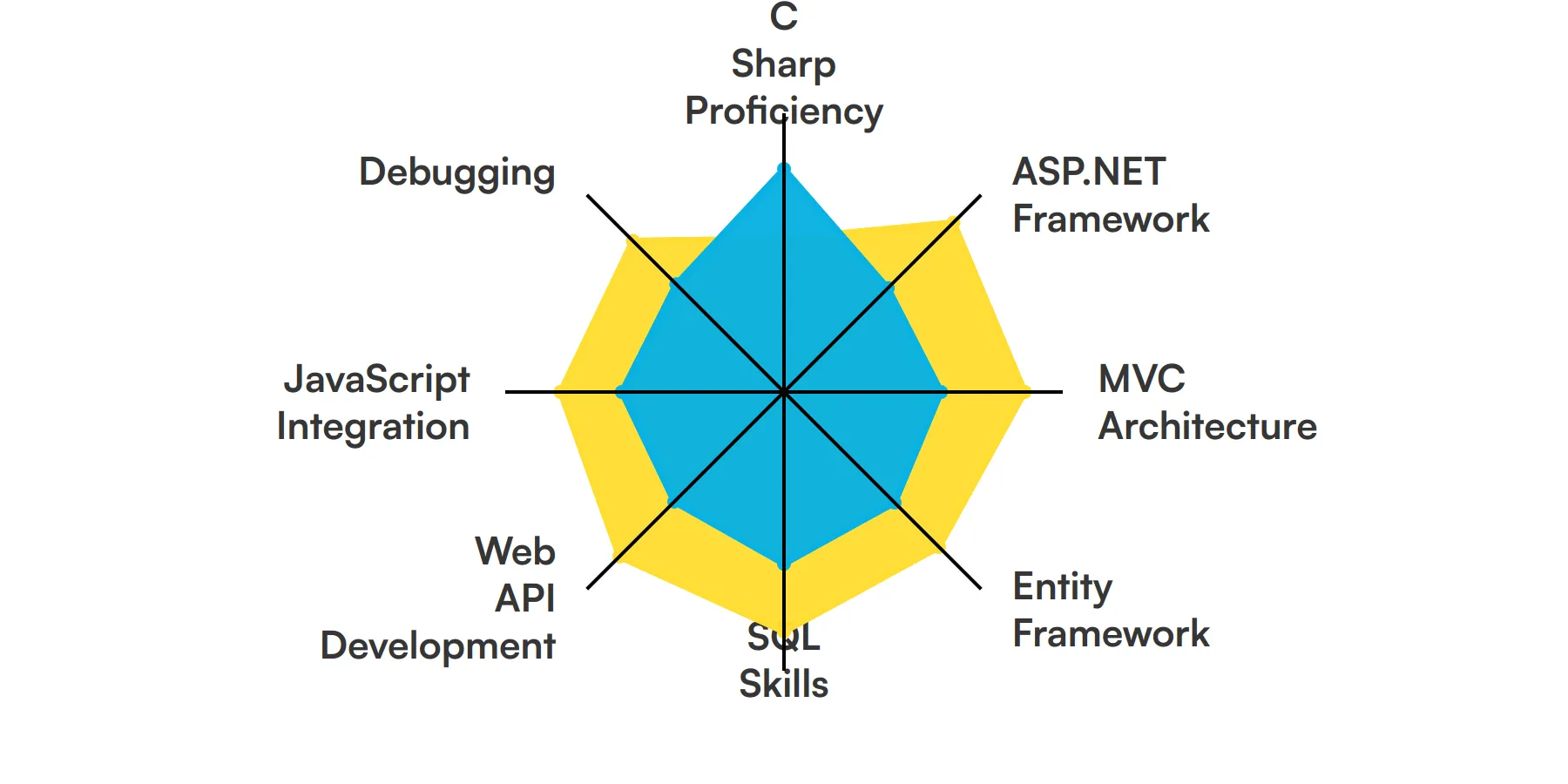
C Sharp Proficiency
C# is the primary language used in ASP.NET development. An ASP.NET developer must have a strong grasp of C# to effectively build and maintain robust web applications. This skill is crucial for writing clean and efficient code that powers the backend of web applications.
For more insights, check out our guide to writing a C# Developer Job Description.
ASP.NET Framework
Understanding the ASP.NET framework is fundamental for developers in this role. It involves knowing how to utilize its features and libraries to create scalable and secure web applications. This knowledge helps in implementing MVC architecture, handling requests, and optimizing web app performance.
MVC Architecture
Mastery of Model-View-Controller (MVC) architecture is essential for structuring ASP.NET applications efficiently. This architectural pattern separates the application into three interconnected components, which simplifies the development process and enhances the ability to manage complexities.
Check out our guide for a comprehensive list of interview questions.
Entity Framework
Entity Framework is a popular ORM used with ASP.NET for data manipulation. An ASP.NET developer uses this to interact with databases seamlessly, reducing the amount of boilerplate code and improving data access efficiency and migration processes.
SQL Skills
Proficiency in SQL is necessary for managing databases within ASP.NET applications. An ASP.NET developer needs to design, query, and manage SQL databases effectively to ensure data integrity and security.
For more insights, check out our guide to writing a SQL Developer Job Description.
Web API Development
Creating and managing Web APIs is a critical skill for ASP.NET developers. It involves understanding how to develop RESTful services that allow web applications to communicate and operate over the internet, enhancing the functionality and reach of web solutions.
JavaScript Integration
Integrating JavaScript with ASP.NET applications is crucial for enhancing front-end functionalities. This skill ensures that the developer can create dynamic and responsive user interfaces that interact smoothly with the backend logic.
Check out our guide for a comprehensive list of interview questions.
Debugging & Testing
An ASP.NET developer must be adept at debugging and testing to ensure the application runs smoothly and is free from bugs. This involves using tools and practices to systematically test web applications to uphold quality and performance standards.
9 secondary ASP Net Developer skills and traits
The best skills for ASP Net Developers include Version Control, HTML/CSS, Cloud Services, Security Practices, Agile Methodologies, UI/UX Design, Performance Optimization, Continuous Integration and Unit Testing.
Let’s dive into the details by examining the 9 secondary skills of a ASP Net Developer.
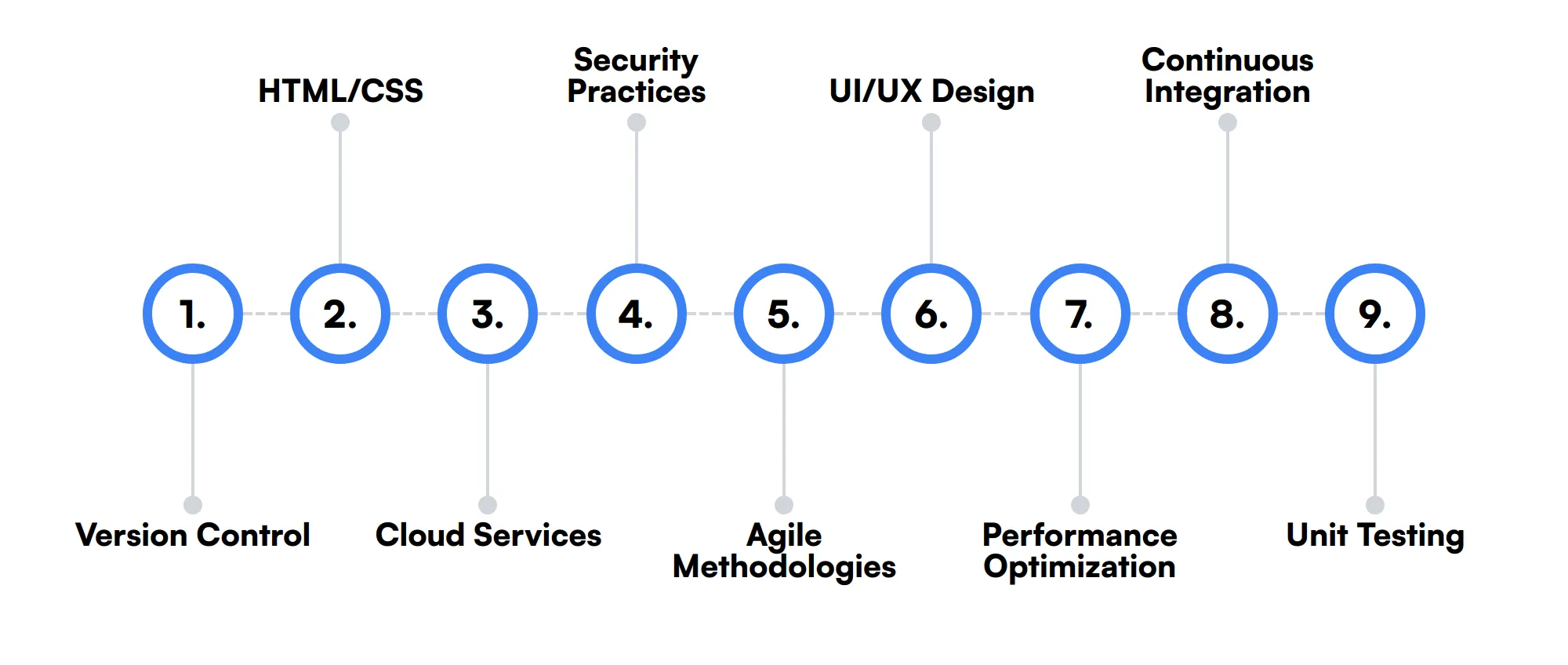
Version Control
Familiarity with version control systems like Git is important for ASP.NET developers to manage changes to the project codebase, collaborate with other developers, and maintain a history of modifications.
HTML/CSS
Basic knowledge of HTML and CSS is beneficial for ASP.NET developers to tweak and manage the front-end components of web applications, ensuring that the user interface is functional and appealing.
Cloud Services
Understanding cloud services such as Azure, which is often integrated with ASP.NET, allows developers to deploy and manage applications efficiently on a global scale.
Security Practices
Knowledge of security practices is necessary to protect ASP.NET applications from vulnerabilities and attacks, ensuring data protection and compliance with legal and regulatory standards.
Agile Methodologies
Experience with Agile methodologies can help ASP.NET developers adapt to changing requirements and improve collaboration and productivity within development teams.
UI/UX Design
While not core to the backend development, understanding principles of UI/UX design can help ASP.NET developers ensure that the application is user-friendly and meets the needs of its users.
Performance Optimization
Skills in performance optimization are important for ASP.NET developers to enhance the speed and responsiveness of web applications, providing a better user experience.
Continuous Integration
Knowledge of continuous integration processes helps ASP.NET developers streamline updates to applications, reducing errors and improving deployment efficiency.
Unit Testing
Developing unit tests is a valuable skill for ASP.NET developers to ensure individual parts of the application function correctly and are free from defects before integration.
How to assess ASP Net Developer skills and traits
Assessing the skills and traits of an ASP.NET developer can be a challenging task. It's not just about knowing the technical skills but also understanding how well they can apply them in real-world scenarios. While resumes can highlight a candidate's experience with C#, ASP.NET Framework, MVC Architecture, Entity Framework, SQL, Web API Development, JavaScript Integration, and Debugging & Testing, they don't provide a complete picture of their proficiency and problem-solving abilities.
To get a comprehensive understanding of a candidate's capabilities, skills-based assessments are invaluable. These assessments allow you to evaluate their practical knowledge and how they approach and solve problems. Adaface on-the-job skill tests can help you achieve this, offering a 2x improved quality of hires and an 85% reduction in screening time. By using these assessments, you can ensure that the ASP.NET developers you hire are well-equipped to meet the demands of your projects.
Let’s look at how to assess ASP Net Developer skills with these 6 talent assessments.
C# Online Test
Our C# Online Test evaluates candidates on their knowledge of C# programming, from basic syntax to advanced concepts like multithreading and network programming.
The test assesses understanding of C# basics, object-oriented programming, error handling, and design patterns. It also challenges candidates with scenarios involving memory management and asynchronous programming.
Successful candidates demonstrate a strong grasp of C# fundamentals, advanced programming techniques, and the ability to write scalable and maintainable code.

Asp.Net MVC Online Test
Our Asp.Net MVC Online Test measures proficiency in the Asp.Net MVC framework, assessing candidates' skills in building robust web applications.
This test evaluates knowledge in C# and JavaScript programming, MVC architecture, and web development essentials like routing, models, views, and controllers.
Candidates who perform well can effectively use the Asp.Net MVC framework to develop well-structured and efficient web applications.
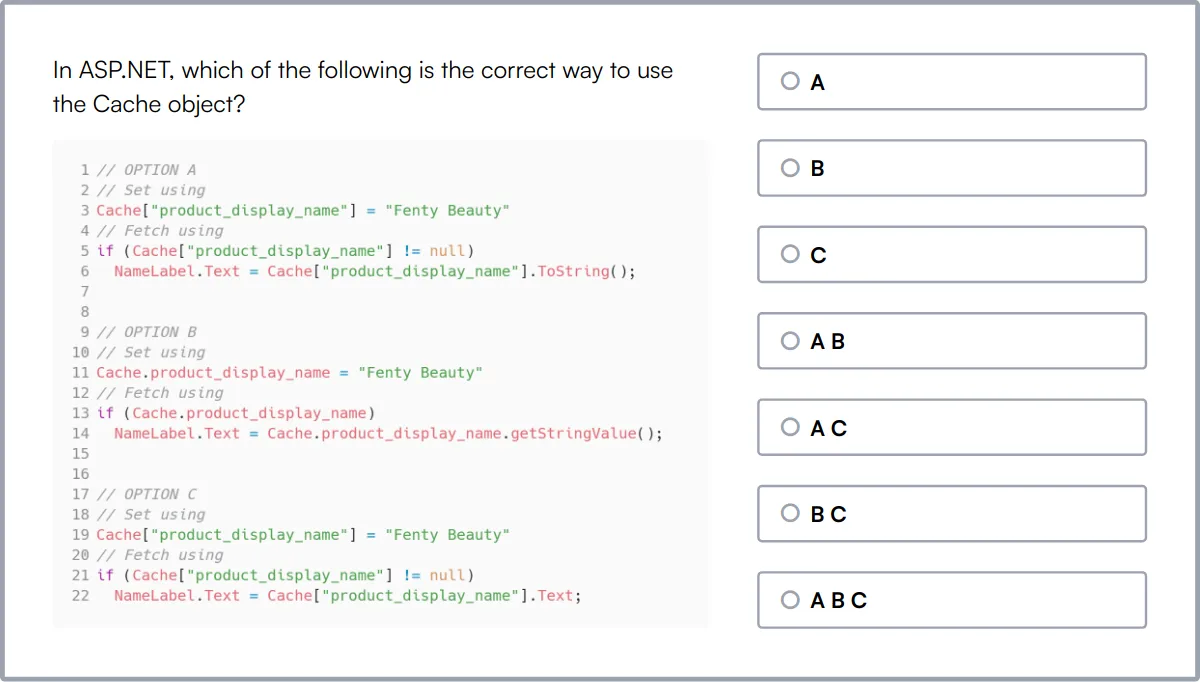
Entity Framework Online Test
Our Entity Framework Online Test focuses on evaluating candidates' expertise in Entity Framework, a critical ORM tool for .NET developers.
The test covers entity modeling, transactions, LINQ integration, and performance tuning in database operations.
High-scoring candidates demonstrate proficiency in managing complex data relationships and optimizing data access and queries in .NET applications.
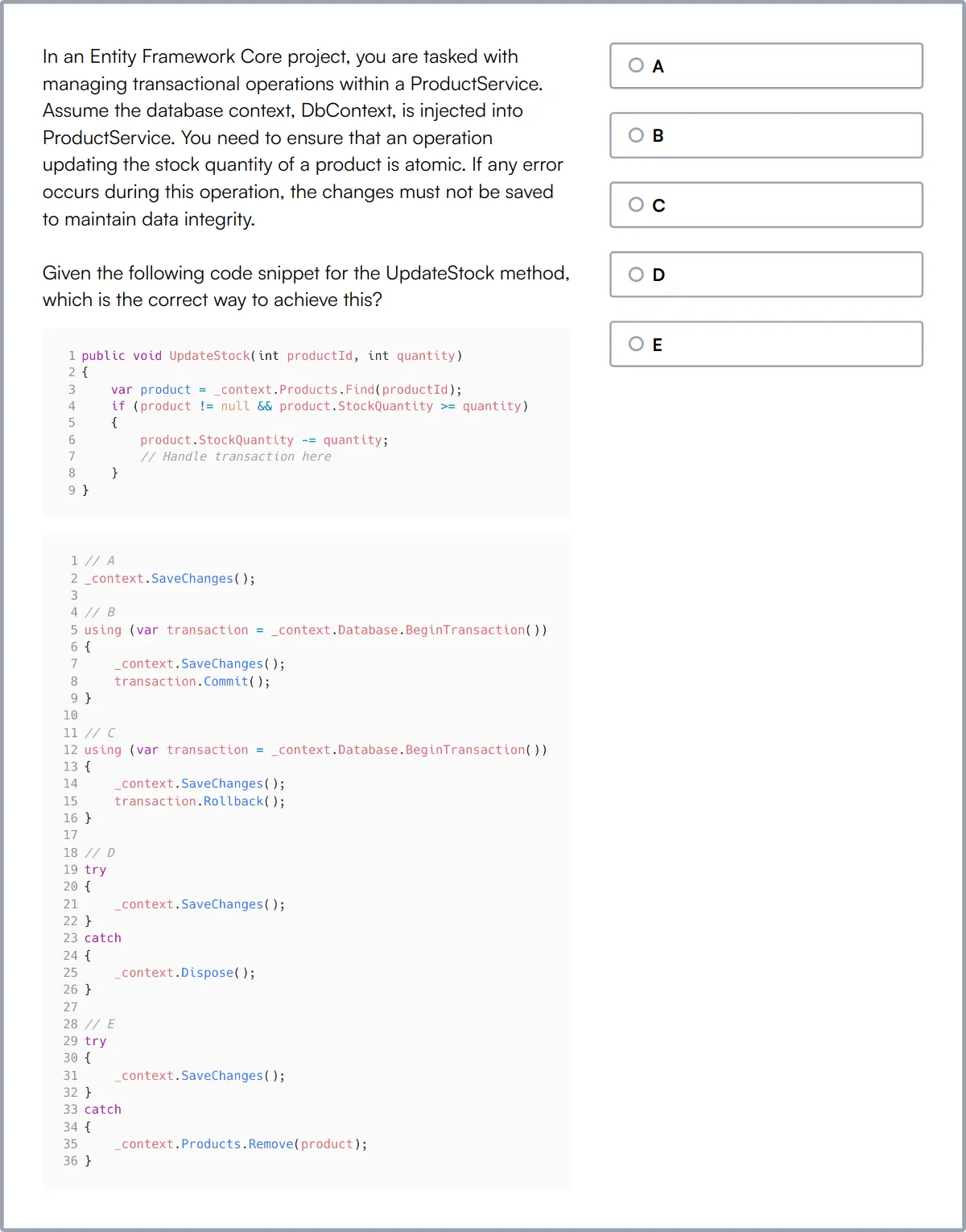
SQL Online Test
Our SQL Online Test assesses a candidate's ability to design, build, and manage databases using SQL.
It challenges candidates with tasks involving database creation, CRUD operations, and writing optimized queries using joins and subqueries.
Candidates excelling in this test show a strong ability to handle complex SQL queries and database management tasks efficiently.

REST API Test
Our REST API Test evaluates a candidate's understanding of RESTful services and their integration into applications.
The test examines knowledge of REST principles, HTTP methods, and best practices in API design.
Adept candidates will demonstrate the ability to design and implement reliable and scalable RESTful services.
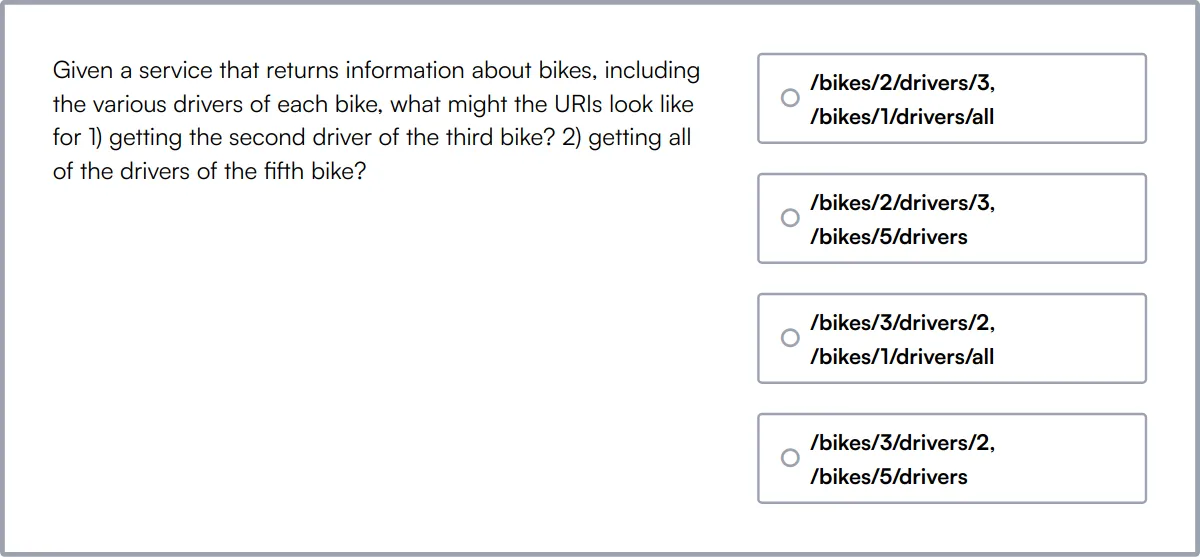
JavaScript Online Test
Our JavaScript Online Test gauges candidates' expertise in JavaScript, from basic programming to advanced concepts like asynchronous programming and API handling.
This test evaluates JavaScript fundamentals, DOM manipulation, ES6 features, and error handling capabilities.
Well-performing candidates are proficient in writing clean, effective JavaScript code and leveraging modern JavaScript features to enhance web application functionality.
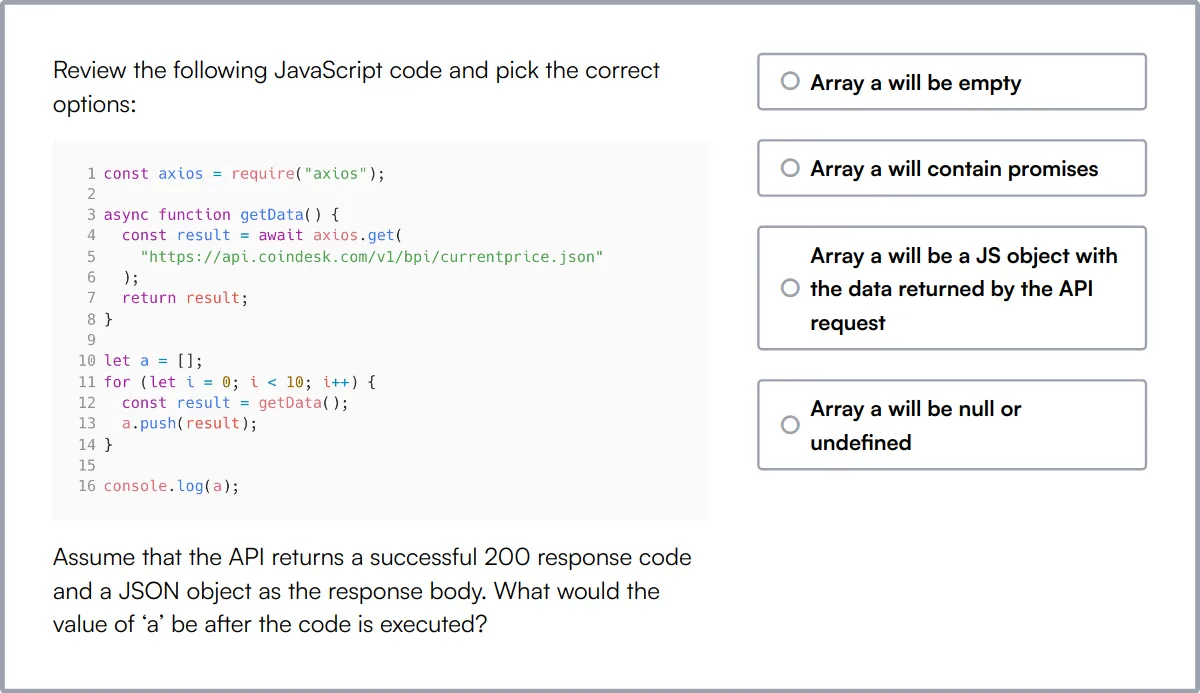
Summary: The 8 key ASP Net Developer skills and how to test for them
| ASP Net Developer skill | How to assess them |
|---|---|
| 1. C Sharp Proficiency | |
| 2. ASP.NET Framework | Assess knowledge in building scalable web applications using ASP.NET. |
| 3. MVC Architecture | Check understanding of the Model-View-Controller design pattern. |
| 4. Entity Framework | Gauge skills in ORM for database operations using Entity Framework. |
| 5. SQL Skills | Measure proficiency in writing and optimizing SQL queries. |
| 6. Web API Development | Evaluate experience in creating and consuming RESTful APIs. |
| 7. JavaScript Integration | Assess ability to integrate JavaScript for dynamic web functionality. |
| 8. Debugging & Testing | Determine capability in identifying and fixing code issues. |
Asp.Net MVC Online Test
ASP Net Developer skills FAQs
What are the key skills required for an ASP.NET Developer?
An ASP.NET Developer should be proficient in C#, understand the ASP.NET framework, MVC architecture, and Entity Framework. They should also have strong SQL skills, experience with Web API development, and knowledge of JavaScript, HTML, and CSS.
How can recruiters assess a candidate's proficiency in C# for an ASP.NET Developer role?
Recruiters can assess C# proficiency through coding tests, reviewing past project contributions, or specific interview questions that explore understanding of C# syntax, libraries, and its application in business solutions.
What is the importance of MVC architecture knowledge in ASP.NET development?
Understanding MVC architecture is important for ASP.NET developers as it helps in organizing code, improving scalability, and separating functions for easier testing and maintenance.
Why is knowledge of Entity Framework beneficial for ASP.NET Developers?
Entity Framework allows developers to work with data using objects of domain-specific classes without focusing on the underlying database tables and SQL for data manipulation. This leads to more efficient data management within applications.
How can understanding of Web API development enhance an ASP.NET Developer's capabilities?
Knowledge of Web API development enables ASP.NET Developers to design and implement robust HTTP services that can be consumed by various clients including browsers and mobile devices, thus enhancing application interoperability.
What role does JavaScript integration play in ASP.NET development?
JavaScript integration is crucial for enhancing the interactivity and responsiveness of web applications. ASP.NET developers use JavaScript to manipulate DOM elements, handle events, and execute AJAX calls for a seamless user experience.
How should recruiters evaluate a candidate's skills in debugging and testing in ASP.NET?
Recruiters can evaluate debugging and testing skills by discussing specific scenarios the candidate has handled, understanding their familiarity with tools like Visual Studio Debugger, and assessing their knowledge in writing unit tests.
What is the significance of security practices in ASP.NET development?
Security practices are key to protecting web applications from threats like SQL injection, cross-site scripting, and data breaches. ASP.NET developers need to implement security measures like authentication, authorization, and secure coding practices.
Assess and hire the best ASP Net Developers with Adaface
Assessing and finding the best ASP Net Developer is quick and easy when you use talent assessments. You can check out our product tour, sign up for our free plan to see talent assessments in action or view the demo here:

40 min skill tests.
No trick questions.
Accurate shortlisting.
We make it easy for you to find the best candidates in your pipeline with a 40 min skills test.
Try for freeRelated posts
Free resources



